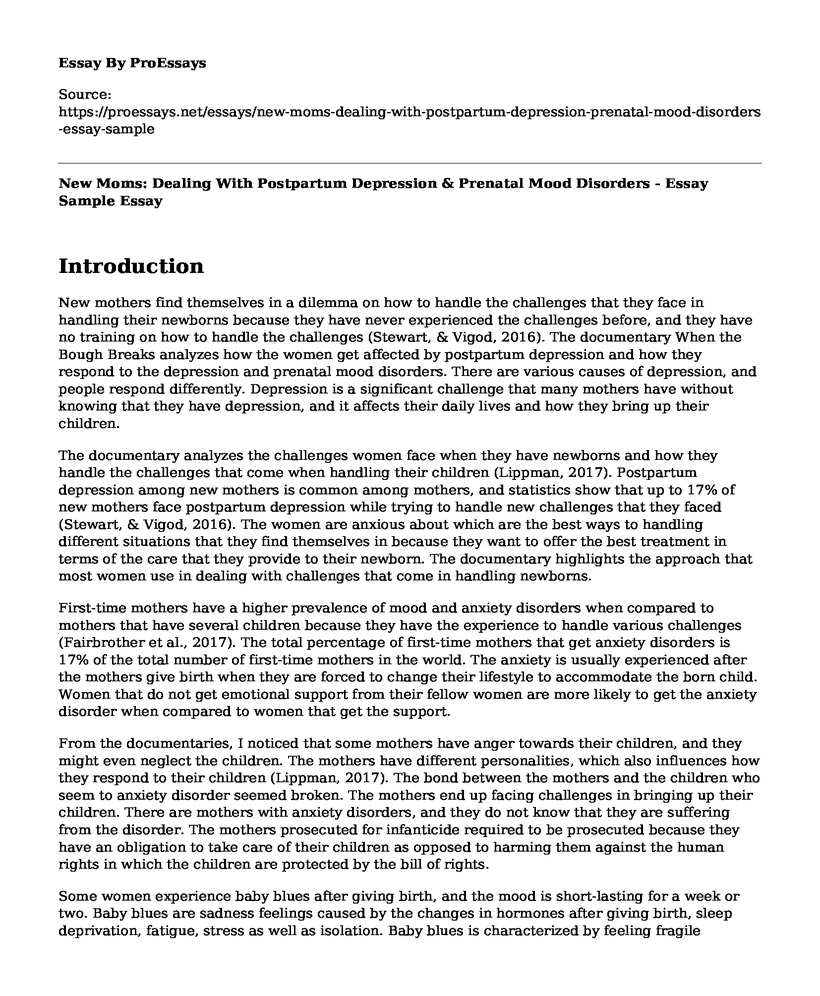Introduction
New mothers find themselves in a dilemma on how to handle the challenges that they face in handling their newborns because they have never experienced the challenges before, and they have no training on how to handle the challenges (Stewart, & Vigod, 2016). The documentary When the Bough Breaks analyzes how the women get affected by postpartum depression and how they respond to the depression and prenatal mood disorders. There are various causes of depression, and people respond differently. Depression is a significant challenge that many mothers have without knowing that they have depression, and it affects their daily lives and how they bring up their children.
The documentary analyzes the challenges women face when they have newborns and how they handle the challenges that come when handling their children (Lippman, 2017). Postpartum depression among new mothers is common among mothers, and statistics show that up to 17% of new mothers face postpartum depression while trying to handle new challenges that they faced (Stewart, & Vigod, 2016). The women are anxious about which are the best ways to handling different situations that they find themselves in because they want to offer the best treatment in terms of the care that they provide to their newborn. The documentary highlights the approach that most women use in dealing with challenges that come in handling newborns.
First-time mothers have a higher prevalence of mood and anxiety disorders when compared to mothers that have several children because they have the experience to handle various challenges (Fairbrother et al., 2017). The total percentage of first-time mothers that get anxiety disorders is 17% of the total number of first-time mothers in the world. The anxiety is usually experienced after the mothers give birth when they are forced to change their lifestyle to accommodate the born child. Women that do not get emotional support from their fellow women are more likely to get the anxiety disorder when compared to women that get the support.
From the documentaries, I noticed that some mothers have anger towards their children, and they might even neglect the children. The mothers have different personalities, which also influences how they respond to their children (Lippman, 2017). The bond between the mothers and the children who seem to anxiety disorder seemed broken. The mothers end up facing challenges in bringing up their children. There are mothers with anxiety disorders, and they do not know that they are suffering from the disorder. The mothers prosecuted for infanticide required to be prosecuted because they have an obligation to take care of their children as opposed to harming them against the human rights in which the children are protected by the bill of rights.
Some women experience baby blues after giving birth, and the mood is short-lasting for a week or two. Baby blues are sadness feelings caused by the changes in hormones after giving birth, sleep deprivation, fatigue, stress as well as isolation. Baby blues is characterized by feeling fragile emotionally, overwhelmed as well as feeling like crying. On the other hand, postpartum depression is a severe problem that is characterized by intense mood swings, excessive crying, loss of appetite, loss of energy, as well as inability to sleep. Postpartum psychosis is one of the postpartum psychiatric illness that makes a mother start seeing, hearing, or believing things that are not real (Stewart, & Vigod, 2016).
The documentary made me understand the struggles that some couples go through when they want to get children. Not all women can conceive and give birth normally hence the growing need for surrogacy. The surrogacy journey is not easy, and sometimes just like in the film, the surrogate mother may be tempted to get in the way of the couple. The situation is even worse when the surrogate mother is married.
Reference
Stewart, D. E., & Vigod, S. (2016). Postpartum depression. New England Journal of Medicine, 375(22), 2177-2186.
Fairbrother, N., Young, A. H., Zhang, A., Janssen, P., & Antony, M. M. (2017). The prevalence and incidence of perinatal anxiety disorders among women experiencing a medically complicated pregnancy. Archives of women's mental health, 20(2), 311-319.
Lippman, J. (2017). When the Bough Breaks [Video]. Retrieved 3 April 2020, from https://www.amazon.com/When-Bough-Breaks-Brooke-Shields/dp/B06XDQZ5SC.
Cite this page
New Moms: Dealing With Postpartum Depression & Prenatal Mood Disorders - Essay Sample. (2023, May 06). Retrieved from https://proessays.net/essays/new-moms-dealing-with-postpartum-depression-prenatal-mood-disorders-essay-sample
If you are the original author of this essay and no longer wish to have it published on the ProEssays website, please click below to request its removal:
- Impact of Media on Mental Health - Essay Sample
- Psychotic Disorder Treatment Paper Example
- Essay Sample on Work-Related Stress: A Growing Threat to Employee Mental Health
- 5-Factor Model of Personality: Exploring Human Behavior - Essay Sample
- Smoking Cessation: Impact of 5A's Tool Counseling Intervention - Research Paper
- Including Children With Special Needs: Modifications for Accommodation - Essay Sample
- Essay Sample on Health Considerations in Canada's Foreign Policy: Impact of Globalization







